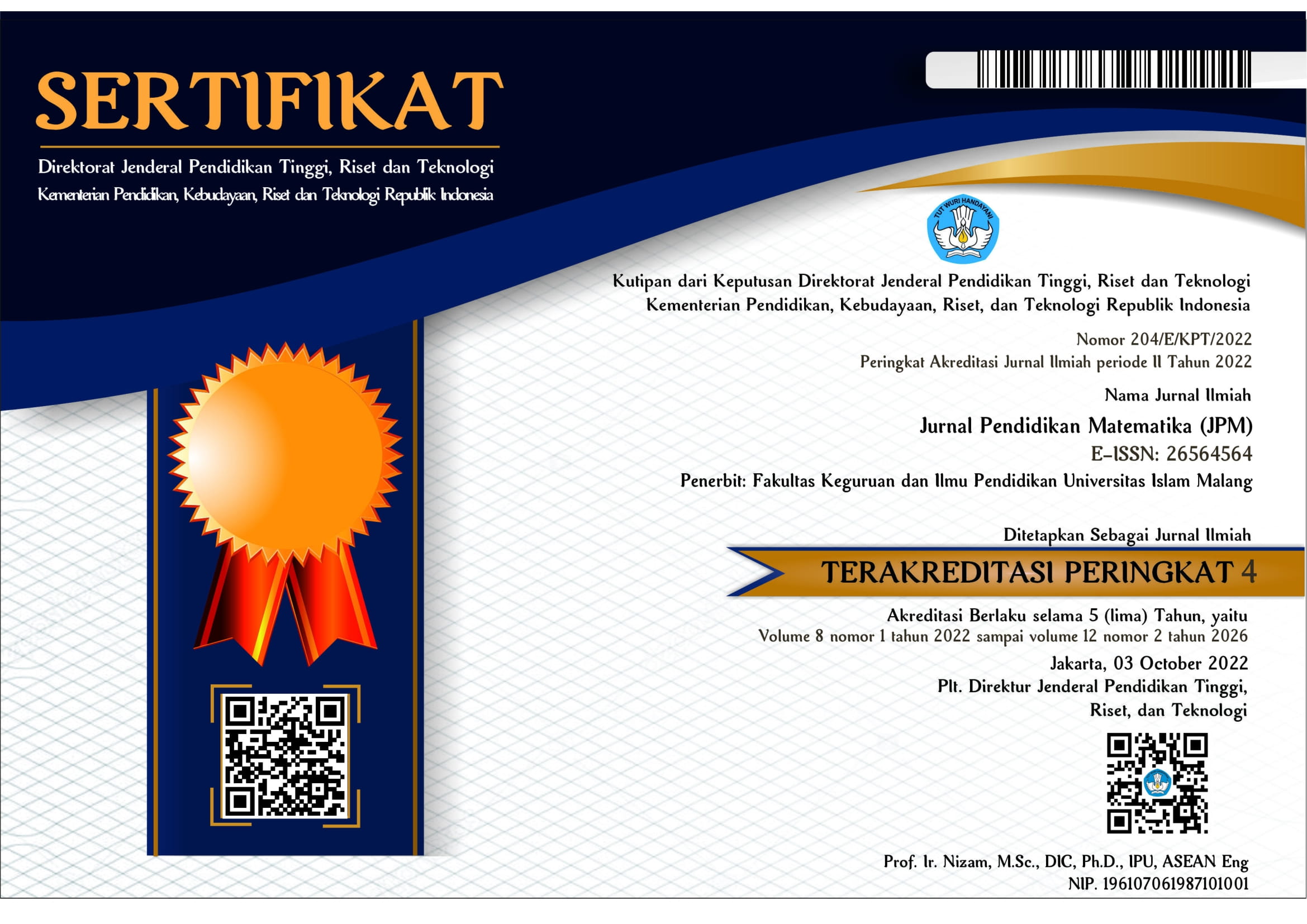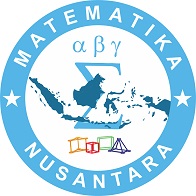KOMUNIKASI MATEMATIK DALAM PEMBELAJARAN PROGRAM LINIER BERKARAKTERISTIK KEWIRAUSAHAAN UNTUK MENUMBUHKAN JIWA WIRAUSAHA MAHASISWA PENDIDIKAN MATEMATIKA
DOI:
https://doi.org/10.33474/jpm.v1i2.821Keywords:
mathematical communication, entrepreneurial spirit, linear programAbstract
This study aims to describe the implementation of mathematical communication skills in teaching linear program with entrepreneurial characteristic to foster the entrepreneurial spirit in students of mathematics education. This study used a qualitative approach, with a type of research is classroom action research, which was conducted in two cycles. Subject of this research is students of mathematics education who take a course in linear program with the total of 25 students. Data were collected through observation, testing, documentation, and field notes. Data were analyzed from early action learning and reflection made up statements. Data analysis techniques used in this research is descriptive qualitative data analysis that includes data reduction, data presentation, analyzing data and drawing conclusions (verification). The validity of the data use triangulation techniques. The results showed that an improvement in mathematical communication skills and foster an entrepreneurial spirit of student in the learning of linear program. This is showed by the data obtained on students’ academic ability success of 76%, the ability of mathematical communications with achievement of 82, 33% and students’ entrepreneurial spirit achieved 79, 67%.
References
Amin, Z. & Eng, K.H. 2006. Basics in Medical Education. Singapore: World Scientific Publishing Co. Pte.Ltd.
Anita Lie. 2002. Cooperative Learning (Mempraktikan Cooperative Learning di Ruang-ruang Kelas). Jakarta: PT. Gramedia Widiasarana Indonesia.
Asma, Nur. 2006. Model Pembelajaran Kooperatif. Jakarta: Departemen Pendidikan Nasional Direktorat Jenderal Pendidikan tinggi Direktorat Ketenagaan
Baumassepe, Andi Nur. 2001. Berwirausaha Sejak Mahasiswa. Makalah. Yogyakarta: STIE YKPN.
Biggs, J. 2006. Teaching for Quality Learning at University. 2nd ed. SRHE and Open University Press Imprint.
Jacob, C. 2003. Matematika sebagai Komunikasi. Makalah pada Seminar Tingkat Nasional. FPMIPA UPI Bandung. Tidak dipublikasikan
Karli Hilda. 2012. Pembelajaran Tematik untuk Meningkatkan Jiwa Kewirausahaan. Jurnal Pendidikan Penabur, No. 19/Vol. 11/ Hal. 52-63.
Karlimah. 2010. “Kemampuan Komunikasi dan Pemecahan Masalah Matematis Mahasiswa Pendidikan Guru Sekolah Dasar melalui Pembelajaran Berbasis Masalahâ€. Jurnal Pendidikan, XI (2), 51-60
Lang, H.R., & Evans, D.N. 2006. Models, Strategis, and Methods for Effective Teaching. USA: Pearson Education, Inc.
Lestari G, Endang & Maliki, MA. 2003. Komunikasi yang Efektif. Lembaga Administrasi Negara. Jakarta
Mahmud. 2011. Metode Penelitian Pendidikan. Bandung: Pustaka Setia
Meredith, G.G. 2005. The Practice of Entrepreneurship. Genewa: Internasional Labor Organization.
Moleong, Lexy J. 2008. Metode Penelitian Kualitatif. Bandung: Remaja Rosdakarya
Mutadi. 2007. Pendekatan Efektif dalam Pembelajaran Matematika. Jakarta: Pusdikat Tenaga Teknis Keagamaan-Depag bekerjasama dengan DIT Bina Widyaiswara LAN-RI.
National Council of Teacher of Mathematics (NCTM). 2000. Prinsiples and Standards for School Mathematics. USA: Key Curiculum Press.
National Council of Teacher of Mathematics (NCTM). 2003. Program Standards for Initial Preparation of Mathematics Teacher. Standards for Secondary Mathematics Teacher. USA: Key Curiculum Press
Patricia. C. Alcaro, dkk. 2000. Fractions Attack! Children Thinking and Talking Mathematically. Teaching Children Mathematics, Vol. 6, No. 9, Mei 2000, hlm. 562-567.
Pugalee, K David. 2001. Using Communication to Develop Students Mathematical Literacy. Mathematics Teaching in the Middle School. Vol. 6, No. 5, Januari, hlm. 296-299.
Purnawan, Yudi. 2007. Deskripsi Model Pembelajaran Berbasis Proyek. (Online) http://www.yudipurnawan.wordpress.com. [Diakses 5 Januari 2014].
R. Soedjadi. 2000. Kiat Pendidikan Matematika di Indonesia. Jakarta: Proyek Pendidikan Tenaga Akademik, Depdiknas.
Ramsden, P. 2006. Learning to Teach in Higher Education. 2nd ed. New York: Routledge Falmer
Sadirman AM. 2005. Interaksi dan Motivasi Belajar Mengajar. Jakarta: Rajawali Pers.
Suderajat, Hari. 2011. Manajemen Pembelajaran Tematik. Bandung: Sekar Gambir Asri.
Sugiyono. 2011. Metode Penelitian Kuantitatif Kualitatif dan R & D. Bandung: Alfabeta.
Sukmadinata, Nana Syaodih. 2011. Metode Penelitian Pendidikan. Bandung: PT Remaja Rosdakarya
Suryana. 2001. Kewirausahaan. Jakarta: Salemba Empat.
Sutama. 2011. Penelitian Tindakan: Teori dan Praktek dalam PTK, PTS, dan PTBK. Surakarta: CV. Citra Mandiri Utama
Wardani, I.G.A.K., dkk. 2003. Penelitian Tindakan Kelas. Jakarta: Pusat Penerbitan Universitas Terbuka.
Wina Sanjaya. 2008. Strategi Pembelajaran Berorientasi Standar Proses Pendidikan. Jakarta: Kencana Prenada Media Group.
Y. Marpaung, dkk. 2010. Gagasan untuk Naskah Akademik Mata Pelajaran Matematika Sekolah Dasar. Jakarta: Kementerian Pendidikan Nasional. Badan Penelitian dan Pengembangan Pusat Kurikulum.
Yamin, Martinis. 2004. Mengembangkan Kompetisi Pebelajar. Jakarta: Universitas Indonesia (UI Press).
Yani, Ramdhani. 2012. Pengembangan Instrumen dan Bahan Ajar untuk Meningkatkan Kemampuan Komunikasi, Penalaran dan Koneksi Mathematis dalam Konsep Integral. Jurnal Penelitian Pendidikan.Vol. 13, No. 1, April 2012





_-_Copy.jpg)
.jpg)
.jpg)










